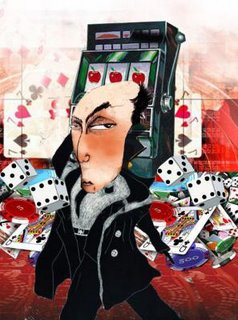Imitates modeled after Alcoholics Anonymous to try to save those who do not resist the charm of the roulette, poker and slot machines.
Miguel V. is an accomplished player. On three occasions he has tried to stay away from gambling, but his addiction was stronger than his will.
This executive Bogota, 39, played in casinos, Monday through Friday. Once out of their work in an advertising agency, seeks a session roulette or poker that just before 2 am.
Sometimes part to his lonely home with hundreds of thousands of pesos, likewise, will bet the next day. At other times, most of the time, the balance of your eyes turn red when you review the other day, the euphoria of the night game, their accounts.
"Only four hours sleep, but I'd come home late to not think that I have debts," says the addict who, for the fourth time, try to seek help from others to heal from their evil.
In previous attempts to escape the gambling, Miguel V. underwent treatments rehabilitation centers, but to return to his world fell back into the fever of gambling. Now he wants to attend the Foundation therapies targeted, non-profit organization modeled after Alcoholics Anonymous to try to cure gamblers.
impulse disorder
What is gambling? Mental illness is a chronic, progressive and relapsing included by the World Health Organization since 1994, in the international classification of disease as a disorder of impulse.
"So I felt for decades, as a mental patient who had no control de sus actos", dice Edgar V., un conocedor de los altos círculos y los bajos fondos de apuestas que decidió organizar Orientamos, un grupo de ‘ludópatas anónimos’, para ayudar a otros que, como le sucedió a él mismo durante más de una década, no pueden escapar al poder absorbente de los casinos.
"El juego patológico es un trastorno que puede definirse como un fracaso crónico y progresivo en resistir los impulsos de apostar, los cuales dominan la vida del enfermo en perjuicio de los valores y obligaciones sociales, laborales y familiares", explica Edgar V. en un escrito con el que promueve su propuesta.
A la Fundación Orientamos llegan personas que have risked or lost their jobs, accumulated debts or abandoned their families. "They also appear ill with symptoms of suicide or crimes," said Ruben A., another of those attending the sessions. To participate you must recognize that you have gambling, intending to heal and preserve the anonymity of the group.
Colombian Pathological Gambling Foundation is another organization that offers healing therapies for problem gambling. Although it is also a non-profit institution, the two-month outpatient treatment costs 1,500.000 pesos. The gamblers have psquiátrica counseling, psychological and legal.
This organization, que ha curado a centenares de adictos al juego, funciona hace 4 años y es reconocida en medio del fervor de los casinos y las apuestas.
‘Necesito ayuda’
La escena de ver llorar a Miguel V. mientras les pide ayuda a los otros ‘ludópatas anónimos’ que asisten a una de las reuniones del grupo, es estremecedora. El adicto, a pesar de ser funcional y haber mantenido su empleo, tiene historias para contar y querer huir de los casinos que le arrebataron una familia, dos casas y varios carros.
Su historia estremece a los otros adictos. "Este es un mal viejo. En ‘El Jugador’ de Fedor Dostoievsky ya está la angustia de los que nos enfermamos por gambling, "says Edgar V. before starting their dream: a night in which several anonymous gamblers gather to exchange experiences away from their evil.
'In my bets lose more than it had'
My name is Alfonso C.
and am on the set of guidelines from the first session.
a couple of months ago I met other gambling addicts who wanted to get away from his illness.
To be honest I do not know if I can achieve my goal. Just take a couple of weeks without betting and I feel that any time I fall again. I've tried everything. I have gone to psychiatrists, doctors, sorcerers and even at the Condor Club, in downtown Bogota. There is low stakes, 500 pesos. I went to 20,000 and I stayed up three days playing poker, but to lose less money you are not cured of evil. I slept badly, had cold sweats and anxiety stay in the game.
This is my last bet. I've lost more than they had.
Recommended for players and their families>
who has to forgive is yourself.
player
Lies are a consequence of the game and part of the problem to be solved.
Once the player has contracted debts must remedy, but solving the economic problem is not solving the problem of the game.
The family is a help to solve the problems, but the responsibility lies with the player.
The punter is the only person able to fix the force of will, his problem.
The player is sick and therefore should be treated with love and respect for his inner circle.
however, should not be approved or allow negative actions incurred as a result of their addiction.
The gambler has to bear the tension in the family will stay for long.
This stressful situation part of problem gambling and will not disappear even if this some time without betting. Being
player does not mean being a bad father, bad husband or bad son.
be betting means having a serious problem that needs treatment.
The relationship between father and children is an important issue regardless of the game.
Pathological gambling, like any other addiction is a disease that requires a slow process of family support for full recovery.
Rebet not mean all is lost. It's just one more reason to continue. HECTOR HURTADO
CANYON Redactor de EL TIEMPO
Con Información de www.juego-patologico.org y Fundación Orientamos.
